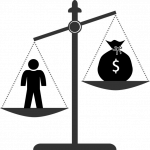 Three types of values
Three types of values
Values are standards or ideals with which we evaluate actions, people, things, or situations. Beauty, honesty, justice, peace, generosity are all examples of values that many people endorse. In thinking about values it is useful to distinguish them into three types:
- Personal values: values endorsed by an individual. For example, some people regard family as their most important value and structure their lives so that they can spend more time with their family. Other people might value success instead, and give less time to their families in order to achieve their goals.
- Moral values: values that help determine what is morally right or wrong, e.g. freedom, fairness, equality, well-being, etc… Those which are used to evaluate social institutions are sometimes also known as political values.
- Aesthetic values: values associated with the evaluation of artwork or beauty.
The Role of Facts and Values
The following are descriptive statements. they purport to describe facts :
- This is a sharp knife.
- Mozart and Beethoven are composers.
- Ann believes that freedom of speech is important.
These, however, are statements about values :
- This knife is a very useful kitchen tool
- Mozart is a greater composer than Beethoven
- Freedom of speech should be protected
Philosophers usually distinguish between two kinds of values: intrinsic and extrinsic. Something is supposed to have extrinsic value when it is not valued for its own sake, but because it contributes to some further purpose, or because it helps bring about something else of value. So a particular kitchen knife might be said to be very valuable in this extrinsic sense – it is valued not for its own sake but because it can be used to satisfy certain culinary purposes that we treasure.

